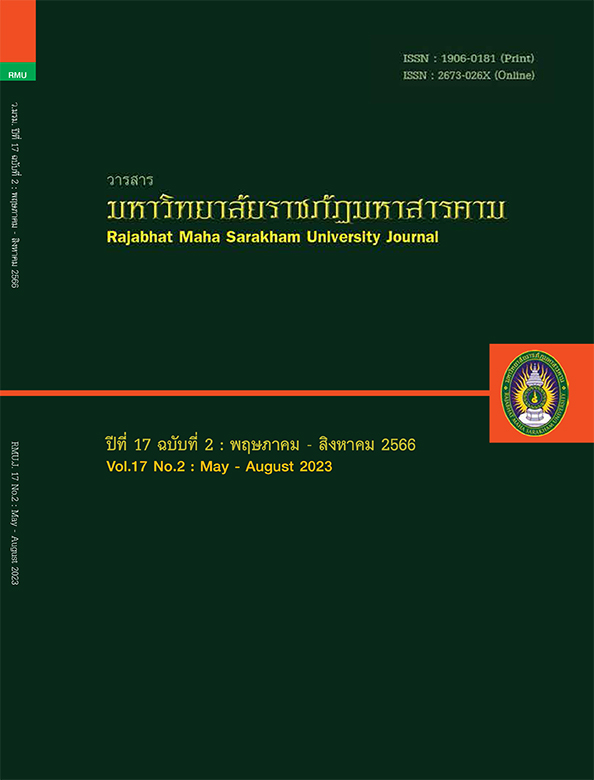การพัฒนาทักษะกระบวนการทางวิทยาศาสตร์ขั้นสูงและผลสัมฤทธิ์ทางการเรียนโดยการจัดการเรียนรู้แบบโครงงานเป็นฐาน เรื่อง พลังงานความร้อนกับการเปลี่ยนแปลงของสสารของนักเรียนชั้นมัธยมศึกษาปีที่ 1
Main Article Content
บทคัดย่อ
การวิจัยครั้งนี้มีวัตถุประสงค์ 1) เพื่อเปรียบเทียบผลสัมฤทธิ์ทางการเรียน ของนักเรียนชั้นมัธยมศึกษาปีที่ 1 ก่อนและหลังจากได้รับ
การจัดการเรียนรู้โดยใช้โครงงานเป็นฐาน และ 2) เพื่อเปรียบเทียบทักษะกระบวนการทางวิทยาศาสตร์ขั้นสูง ของนักเรียนชั้นมัธยมศึกษา
ปีที่ 1 ก่อนและหลังจากได้รับการจัดการเรียนรู้โดยใช้โครงงานเป็นฐาน กลุ่มตัวอย่างที่ใช้ในการวิจัย คือ นักเรียนชั้นมัธยมศึกษาปีที่ 1 โรงเรียนสาธิตมหาวิทยาราชภัฏมหาสารคาม ภาคเรียนที่ 2 ปีการศึกษา 2565 จำนวน 20 คน โดยการสุ่มแบบกลุ่ม (Cluster Random Sampling) เครื่องมือที่ใช้ในการวิจัย ประกอบด้วย 1) แผนการจัดการเรียนรู้แบบโครงงานเป็นฐาน จำนวน 1 แผน จำนวน 18 ชั่วโมง
มีความเหมาะสมอยู่ในระดับมาก ( =4.33, S=0.58) 2) แบบทดสอบวัดผลสัมฤทธิ์ทางการเรียน เรื่อง พลังงานความร้อนกับ
การเปลี่ยนแปลงของสสาร ชนิดเลือกตอบ 4 ตัวเลือก จำนวน 20 ข้อ มีค่าดัชนีความสอดคล้อง (IOC) เท่ากับ 1.0 ค่าความยาก (p) มีค่าตั้งแต่ 0.33-0.80 ค่าอำนาจจำแนก (B) มีค่าตั้งแต่ 0.44-0.92 และมีค่าความเชื่อมั่น (Lovett) เท่ากับ 0.81 3) แบบทดสอบวัดทักษะกระบวนการทางวิทยาศาสตร์ขั้นสูง ชนิดเลือกตอบ 4 ตัวเลือก จำนวน 20 ข้อ มีค่าดัชนีความสอดคล้อง (IOC) เท่ากับ 1.0 ค่าความยาก (p) มีค่าตั้งแต่ 0.33-0.71 ค่าอำนาจจำแนก (B) มีค่าตั้งแต่ 0.29-0.91 และมีค่าความเชื่อมั่น (KR-20) เท่ากับ 0.82 การวิเคราะห์ข้อมูลโดยใช้ ร้อยละ ค่าเฉลี่ย ( ) ส่วนเบี่ยงเบนมาตรฐาน (S) และทดสอบที (Dependent-Sample t-test)
ผลการวิจัยสรุปได้ดังนี้ นักเรียนที่เรียนโดยรูปแบบโครงงานเป็นฐาน เรื่องพลังงานความร้อนกับการเปลี่ยนแปลงของสสาร มีผลสัมฤทธิ์ทางการเรียนหลังเรียน ( =14.20, S=1.70) สูงกว่าก่อนเรียน (
=9.05, S=1.73) อย่างมีนัยสำคัญทางสถิติที่ระดับ .05 และมีทักษะกระบวนการทางวิทยาศาสตร์ขั้นสูงหลังเรียน (
=15.45, S=3.64) สูงกว่าก่อนเรียน (
=9.95, S=3.85) อย่างมีนัยสำคัญทางสถิติ
ที่ระดับ .05
Article Details

อนุญาตภายใต้เงื่อนไข Creative Commons Attribution-NonCommercial-NoDerivatives 4.0 International License.
1. บทความที่ลงตีพิมพ์ทุกเรื่องได้รับการตรวจทางวิชาการโดยผู้ประเมินอิสระ ผู้ทรงคุณวุฒิ (Peer Review) สาขาที่เกี่ยวข้อง อย่างน้อย 3 ท่าน ในรูปแบบ Double blind review
2. ข้อคิดเห็นใด ๆ ของบทความที่ลงตีพิมพ์ในวารสารมหาวิทยาลัยราชภัฏมหาสารคาม นี้เป็นของผู้เขียน คณะผู้จัดทำวารสารไม่จำเป็นต้องเห็นด้วย
3. กองบรรณาธิการวารสารมหาวิทยาลัยราชภัฏมหาสารคาม ไม่สงวนสิทธิ์การคัดลอกแต่ให้อ้างอิงแสดงที่มา
เอกสารอ้างอิง
กระทรวงศึกษาธิการ. (2551). หลักสูตรแกนกลางการศึกษาขั้นพื้นฐานพุทธศักราช 2551.กรุงเทพฯ:กระทรงศึกษาธิการ.
ชุลีพร บุตรโคตร. (2555). ครูสอนวิทย์วิกฤติหนัก-สสวท.จี้เร่งแก้. สืบค้นจาก www.tcijthai.com/news/2012/30/scoop/1054.
ธีรพัฒน์ วงศ์คุ้มสิน และเฉลิมขวัญ สิงห์วี. (2563). การจัดการเรียนรู้แบบใช้โครงงานเป็นฐานเพื่อพัฒนาการเรียนรู้ด้วยการนำตนเอง. วารสารสังคมศาสตร์และมนุษยศาสตร์, 46(1), 218-253.
ธีระชัย ปูรณโชติ. (2531). การสอนกิจกรรมโครงงานวิทยาศาสตร์: คู่มือสำหรับครู. กรุงเทพฯ: จุฬาลงกรณ์มหาวิทยาลัย.
ประสาท เนืองเฉลิม. (2558). การเรียนรู้วิทยาศาสตร์ในศตวรรษที่ 21. กรุงเทพฯ: สำนักพิมพ์ แห่งจุฬาลงกรณ์มหาวิทยาลัย.
ปวัลย์รัตน์ สุวรรณโคตร. (2558). การใช้วิธีการสอนแบบใช้โครงงานเป็นฐาน (PBL) ในการพัฒนาทักษะกระบวนการทางวิทยาศาสตร์ขั้นบูรณาการ. (วิทยานิพนธ์ปริญญามหาบัณฑิต). กรุงเทพฯ: มหาวิทยาลัยรามคําแหง.
พัฒน์ชนน คงอยู่ และคณะ. (2562). การจัดการเรียนรู้โดยใช้กิจกรรมโครงงานเป็นฐาน เรื่องงานและพลังงานกรณีศึกษา: โรงเรียนมัธยมวัดเขาสุกิม. วารสารแสงอีสาน มหาวิทยาลัยมหามกุฎราชวิทยาลัย วิทยาเขตอีสาน, 16(2), 1.
พิมพันธ์ เดชะคุปต์ และคนอื่น ๆ. (2553). การสอนคิดด้วยโครงงาน: การเรียนการสอนแบบบูรณาการทักษะในศตวรรษที่ 21. กรุงเทพฯ: โรงพิมพ์แห่งจุฬาลงกรณ์มหาวิทยาลัย.
พิมพันธ์ เดชะคุปต์ และพเยาว์ ยินดีสุข. (2548). วิทยาศาสตร์และวิทยาศาสตร์ทั่วไป. กรุงเทพฯ: บริษัทพัฒนาคุณภาพวิชาการ (พ.ว.) จำกัด.
ไพศาล วรคำ. (2564). การวิจัยทางการศึกษา (พิมพ์ครั้งที่ 12). มหาสารคาม: ตักสิลาการพิมพ์.
ภูวสิษฏ์ บุญศรี. (2562). การพัฒนากระบวนการการจัดการเรียนรู้โดยใช้โครงงานเป็นฐานเพื่อส่งเสริมการคิดอย่างมีวิจารณญาณและการคิดแก้ปัญหาของนักเรียนชั้นประถมศึกษาปีที่ 6 โรงเรียนบ้านโป่ง สำนักงานเขตพื้นที่การศึกษาประถมศึกษาเชียงราย เขต 1. สำนักงานคณะกรรมการการศึกษาขั้นพื้นฐานกระทรวงศึกษาธิการ.
วรุณีพร ขวัญโพก และน้ำฝน เบ้าทองคำ. (2563). การพัฒนาผลสัมฤทธิ์ทางการเรียนและทักษะกระบวนการทางวิทยาศาสตร์ขั้นบูรณาการของนักเรียนชั้นมัธยมศึกษาปีที่ 2 เรื่องดินโดยใช้วิธีการจัดการเรียนรู้แบบโครงงานเป็นฐาน. วารสารครุศาสตร์สาร, 14(1), 1.
สถาบันส่งเสริมการสอนวิทยาศาสตร์และเทคโนโลยี. (2556). คู่มือการใช้หลักสูตรวิทยาศาสตร์ฉบับอนาคตชั้นมัธยมศึกษาปีที่ 1. กรุงเทพฯ: สถาบันส่งเสริมการสอนวิทยาศาสตร์และเทคโนโลยี.
สถาบันส่งเสริมการสอนวิทยาศาสตร์และเทคโนโลยี. (2555). การวัดผลประเมินผลวิทยาศาสตร์. กรุงเทพฯ: ซีเอ็ดยูนิเคชัน.
สถาบันส่งเสริมการสอนวิทยาศาสตร์และเทคโนโลยี. (2546). การจัดสาระการเรียนรู้กลุ่มวิทยาศาสตร์. กรุงเทพฯ: สถาบันส่งเสริมการสอนวิทยาศาสตร์และเทคโนโลยี. สถาบันทดสอบทางการศึกษาสำนักงานคณะกรรมการการศึกษาขั้นพื้นฐาน.
สุวิทย์ และอรทัย มูลคำ. (2547). 21 วิธีการจัดการเรียนรู้เพื่อพัฒนาทักษะกระบวนการทางวิทยาศาสตร์. (พิมพ์ครั้งที่6). กรุงเทพฯ: ภาพพิมพ์.
Barell, J. (2010). Problem-Based Learning: The foundation for 21st Century skills. In J. Bellanca &R. Brandt (Eds), 21st Century Skill: RethinkingHow Student Learn. Bloomington, IN: Solution Tree Press.
Bender, W. N. (2012). Project-Based Learning: Differentiating Instruction for the 21st Century.California: CORWIN A SAGE.


